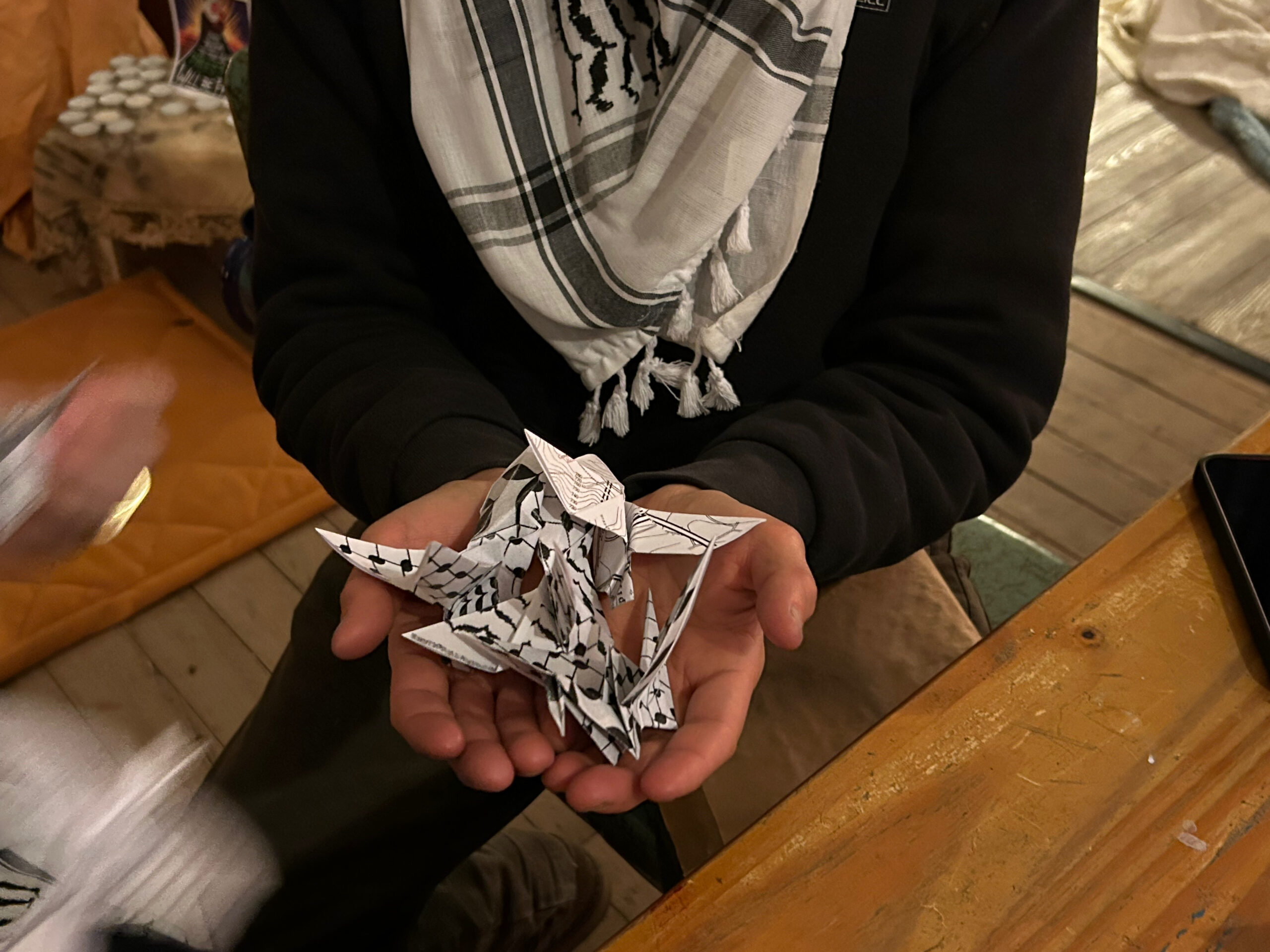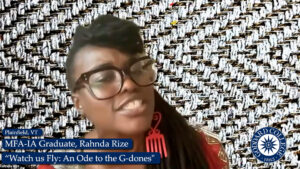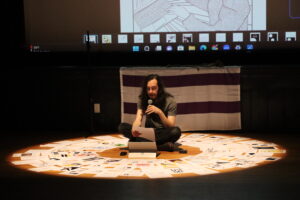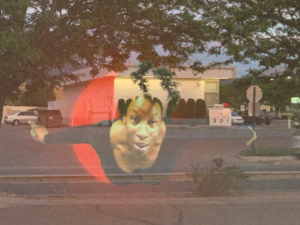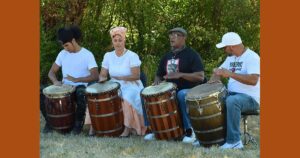Fran Sillau in Conversation with Ruth Wallen

This interview with Fran Sillau one of several with Goddard alums exploring how they are adapting teaching and collaborative practices to the social isolation in which we find ourselves. This interview with MFAIA-VT Lead Faculty, Ruth Wallen, was conducted remotely in early May 2020.
Fran Sillau graduated from Goddard College’s MFA in Interdisciplinary Art program in 2016. He came to Goddard with experience as a professional teaching artist. “I was on that teaching artist grind,” he said, “going into schools five days a week, teaching Saturday morning classes, working twelve hours a day just being a teaching artist integrating arts into the math, science, English, and history curriculum.” His goal for graduate study was to become an arts administrator, running his own company. This interview focuses on his work with Circle Theater, where he has served as Artistic Director since receiving his MFA degree.

Ruth Wallen: Can you tell me about Circle Theater?
Fran Sillau: When I was finishing my degree at Goddard I had the opportunity to take over this thirty-three year old theater company in my hometown, Omaha Nebraska. I had worked there as a young person. When I started, there was no Board, I had nothing but a 501C3. There were either people that had thought the theater existed but has long since closed, people that remembered how it used to be, or people that had never heard of us. So, we developed a strategic plan. We got a board together. We got a new space, sharing it with a church — a progressive church that had a community center that allowed us to hang lights and gave us a storage space at an economical cost. Then we produced our first play, a co-commission with another organization. After that we produced four shows for the first three years. Then we went down to three shows, plus an outreach program. Now we’re on pause.
Ruth: Yes, I recall that you were working on the mission statement and a financial plan for the theater as part of your studies at Goddard. Can you tell us more about what makes Circle Theater unique?
Fran: Our mission promotes the inclusion of differently-abled individuals to view and participate in high quality theater in a barrier free environment. Differently-abled is a word that I learned at Goddard. I was using the word “disability.” Differently-abled is more inclusive because it embraces neurodiversity; it isn’t just about the physical or the way we look. I have cerebral palsy. I walk with crutches. I was thinking of disability from that lens, but my advisor, Rachael Van Fossen, broadened my perspective.
What I’ve done is create a space for individuals who have never done theater before, individuals that have done it but were disenfranchised by it, and individuals that have come from a place of trauma or trouble in their world. We’ve been able to create this space where everybody can come together and create the highest quality of theater that we can possibly muster. We don’t compare ourselves to anybody else. We’re creating the best program that we can with light, sound, costumes, the whole shebang. Anybody can come and enjoy this. It’s taken a while for that to catch on, but now people in the community understand what we’re about.
We create everything from musicals, like Godspell, which we just produced, to Dracula and Sherlock Holmes to a differently-abled version of the Hobbit. We take stories that people know and we do it the Circle way. In August of 2021, we’re taking a book written by Minneapolis based artist Leslie Orr which is all about people with disabilities working together in a neighborhood to create something more than they had before. We also work with institutions like the Institute for Holocaust Education. We take stories of local survivors and we create plays out of them. We did one in 2016, which is now published, and we have one that will come out in April of 2021.
We offer an internship program for individuals with different abilities that want to learn backstage skills. Furthermore, we do a play writing festival within special education classrooms in schools where they create short plays with a professional playwright that we then share in a showcase at the theater.

Ruth: Fantastic. It’s really wonderful to hear how all of this is blossomed since I knew you were a student. Have you been able to adapt any of this work to the digital world that we now find ourselves in?
Fran: We thought about the digital world long before a pandemic, because many people of different abilities don’t feel comfortable in a traditional theater space because they need to control the environment they’re in. Then I got a phone call from my playwright in residence saying, I think we need a Covid-19 plan. We quickly developed a way to record videos of our instruction online that could be uploaded to Google classroom so students could finish their plays. We realized, especially with the population that we work with, that the schools weren’t prepared to do anything. We just finished those videos last week.
We’d also taken to teaching acting classes via Zoom. I’ve been working as I go, figuring out all the trappings and pitfalls. I’ve learned that we can connect. When I teach a class, we start in a circle and we do a check-in. You know, just like you and I did. How are you? What’s your day like? We start with a question of the day. I still do that. I just want to make sure that everybody has a chance to share. And then as I go through the exercises and the activities of the day, I want to make sure that I call every student by name at least once to share with them some positive observations that I have witnessed. I try to make sure that the activities that we do can be explored at someone’s own pace. We’re not doing reader’s theater where somebody has to speak at a certain time for the play to go. I use popcorn activities where we make up a story. It’s my turn to speak; then it’s Ruth’s turn to speak; then it’s George’s turn to speak. But we can wait if George needs a moment to think about what George is doing. The whole story doesn’t stop. When George is ready, he can come with us. It’s about finding ways to adapt the activities. We’re trying to do these drama games as a start because I really want to start writing this play with them, this Leslie Orr piece so that we’re ready by August 2021. I’m hoping that we can all be together in real time by then.
Ruth: Are there other things that you’re thinking about working on in a digital platform?
Fran: I am thinking about talking with writers to write short plays online that can be done at home. There are a lot of places that have done this. The Kennedy Center has written plays for families to do online. But I’ve been trying to think about groups of people for whom reading is not your thing. How can you devise a program to keep individuals with disabilities engaged and help them create ideas for a play or some sort of happening, even it’s only ten minutes, that doesn’t involve writing? How do you engage the beginning, middle and end? Since it’s not in real time, it’s about creating a video that’s engaging enough. It gives them enough ideas so that they can take something and run with it.
Fran Sillau serves as the Accessibility Coordinator at The Omaha Theater Company (The Rose), where he coordinates educational opportunities for students with disabilities and ensures that every individual who passes through the doors of The Rose can access all programing equally. He also directs MainStage productions and some of his credits at the Rose include Shrek: The Musical TYA, Go,Dog.Go!, Hanna’s Suitcase, and The Doll Maker’s Gift .Sillau serves as Executive Artistic Director of Circle Theatre, a company dedicated to creating theater that includes artists with disabilities.(www.circletheatreomaha.org). Under Sillau’s leadership, the Circle co-commissioned My Broken Doll, a play based on the life of holocaust survivor Beatrice Karp, adapted by Ernie Nolan, and Over The River, a play about friendship by Ellen Struve. Both plays are currently touring the state of Nebraska. In December of 2016, Sillau directed a regional premiere of A Charlie Brown Christmas. This particular production incorporated American Sign Language, Shadow interpreting, Audio Description, as well as actors with various physical and developmental disabilities. He holds an MFAIA from Goddard College and currently serves on the board of directors for The American Alliance for Theater and Education.
The Master of Fine Arts in Interdisciplinary Arts (MFAIA) program at Goddard College is a unique graduate experience at the intersection of contemporary art practice and Goddard’s landmark method of low-residency, human-centered learning and teaching. Get Info

